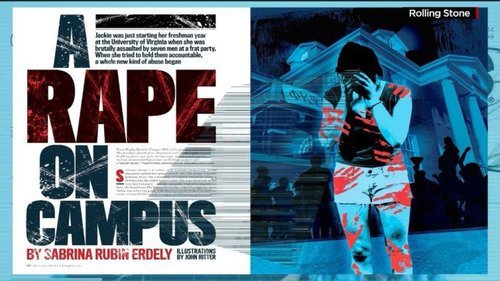
NYT Demonstrates Power of the Megaphone to Ignore Pesky Questions Like … Did the Rolling Stone Gang Rape Actually Happen?
By Steve Sailer
12/04/2014
The New York Times declares:
Widening Spotlight On Assault Of Women By JENNIFER STEINHAUER DEC. 4, 2014Members of the audience at a board of visitors meeting about sexual assault at the University of Virginia on Nov. 25, held after a Rolling Stone article outlined a gang rape allegation. The school found itself under increasing scrutiny this week. Credit Ryan M. Kelly/The Daily Progress, via Associated Press
WASHINGTON — There is little to intersect the lives of a college freshman, a 59-year-old former model and a Marine Corps veteran of the Iraq war. Their targets — a prestigious state university, a long-beloved entertainer and the United States military — do not have much in common, either.
But in just the last week, the governing board of the University of Virginia has scrambled to answer allegations that it has mishandled sexual assault claims by women after Rolling Stone magazine published an account of a freshman who says she was raped at a fraternity party, and more than a dozen women, long in the shadows, have come forward with allegations that they were raped by the comedian and actor Bill Cosby. A new military study released Wednesday night demonstrated that reports of rapes and sexual assaults had increased 8 percent, and Congress reopened the debate over how to best address that problem — one that potentially threatens the life of a major defense bill and perhaps the confirmation of a new defense secretary.
While protests of the so-called rape culture on college campuses have surfaced before — Take Back the Night marches are decades old — the sudden convergence of exposure and outrage over these acts of sexual violence suggests a tolerance tipping point in American culture for a problem that institutions and victims alike have long hidden from view.
“I think we are at a critical moment,” said Eugene R. Fidell, an expert on military justice at Yale Law School. …
What has changed are the willingness of women to come forward in ways that would have been unthinkable in the past and, as a result, the pressure on institutions to respond to issues that were once allowed to fester just out of sight. …
What is still in question is whether awareness will lead to effective change in an emotionally charged landscape where the overall problems are clear, but the facts in individual cases can often be elusive.
For all the talk of “zero tolerance” on campuses, in the military and in the White House of sexual assault, extensive legislation on Capitol Hill has yet to move forward and President Obama has largely stayed out of the fray on the issue. The Obama administration has begun to put more pressure on universities and expose which ones are under investigation. But the federal government has yet to pull out its biggest gun: the ability to take away federal funding from universities that are found to violate student rights in sexual assault cases. …
After the Rolling Stone article detailing a gang rape allegation and an emergency meeting of the board, the University of Virginia found itself under increasing scrutiny this week. Virginia lawmakers have called for hearings on the matter; the Southern Association of Colleges and Schools Commission on Colleges sent the university a letter asking officials to demonstrate they are in compliance with student safety standards; and more than 1,000 alumni have written emails about the incident. …
There are several similarities in the challenges faced by colleges and the military, where the adjudication of sexual assault often is conducted outside the criminal justice system. … At the same time, the Obama administration has pressed universities hard to better report and deal with sexual assault under laws many have flouted. …
Some universities are also reconsidering their policies on Greek life, which some critics have insisted are at the center of sexual violence on campus. … The University of Virginia has suspended its fraternity activities until January.
That university’s Board of Visitors is expected to develop new and tougher policies for assaults on campus that officials desperately hope can rewind its growing image as a symbol of rape culture.
You’ll notice that the long article does not mention the severe doubts that have emerged about the Rolling Stone story recounting a supposed Night of Broken Glass at a University of Virginia frat house.
Depressingly, of the first 128 readers’ comments approved by the NYT, only two point out that there is a controversy over the Rolling Stone text’s factuality.
Update: A video has emerged in which a participant in the U. of Virginia fraternity gang rape initiation ritual confirms every single detail of the Rolling Stone article based on his own experience a generation before (extremely Not Safe for Work). So this New York Times reporter has been utterly vindicated in her decision to threat Sabrina Rubin Erdely’s gang rape tale as Gospel. My apologies.

